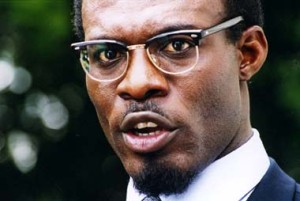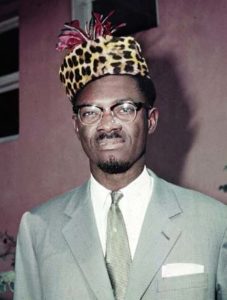Patrice Lumumba (2 Jul 1925 – 17 Jan 1961)
BIOGRAPHIES, 1 Jul 2019
Encyclopedia Britannica – TRANSCEND Media Service
Patrice Hemery Lumumba was an African nationalist leader and the first prime minister of the Democratic Republic of the Congo (June–September 1960). Forced out of office during a political crisis, he was assassinated a short time later.
[Malcolm X, speaking at a rally of the Organisation of Afro-American Unity in 1964, described Patrice Lumumba as ’the greatest black man who ever walked the African continent. He didn’t fear anybody. He had those people [the colonialists] so scared they had to kill him. They couldn’t buy him, they couldn’t frighten him, they couldn’t reach him.’ –TMS Editor]
Lumumba was born in the village of Onalua in Kasai province, Belgian Congo. He was a member of the small Batetela ethnic group, a fact that became significant in his later political life. His two principal rivals, Moise Tshombe, who led the breakaway of the Katanga province, and Joseph Kasavubu, who later became the Congo’s president, both came from large, powerful ethnic groups from which they derived their major support, giving their political movements a regional character. In contrast, Lumumba’s movement emphasized its all-Congolese nature.
After attending a Protestant mission school, Lumumba went to work in Kindu-Port-Empain, where he became active in the club of the évolués (Western-educated Africans). He began to write essays and poems for Congolese journals. He also applied for and received full Belgian citizenship. Lumumba next moved to Léopoldville (now Kinshasa) to become a postal clerk and went on to become an accountant in the post office in Stanleyville (now Kisangani). There he continued to contribute to the Congolese press.
In 1955 Lumumba became regional president of a purely Congolese trade union of government employees that was not affiliated, as were other unions, to either of the two Belgian trade-union federations (socialist and Roman Catholic). He also became active in the Belgian Liberal Party in the Congo. Although conservative in many ways, the party was not linked to either of the trade-union federations, which were hostile to it. In 1956 Lumumba was invited with others on a study tour of Belgium under the auspices of the minister of colonies. On his return he was arrested on a charge of embezzlement from the post office. He was convicted and condemned one year later, after various reductions of sentence, to 12 months’ imprisonment and a fine.
When Lumumba got out of prison, he grew even more active in politics. In October 1958 he, along with other Congolese leaders, launched the Congolese National Movement (Mouvement National Congolais; MNC), the first nationwide Congolese political party. In December he attended the first All-African People’s Conference in Accra, Ghana, where he met nationalists from across the African continent and was made a member of the permanent organization set up by the conference. His outlook and vocabulary, inspired by pan-African goals, now took on the tenor of militant nationalism.
As nationalist fervour increased, the Belgian government announced a program intended to lead to independence for the Congo, starting with local elections in December 1959. The nationalists regarded this program as a scheme to install puppets before independence and announced a boycott of the elections. The Belgian authorities responded with repression. On October 30 there was a clash in Stanleyville that resulted in 30 deaths. Lumumba was imprisoned on a charge of inciting to riot.
The MNC decided to shift tactics, entered the elections, and won a sweeping victory in Stanleyville (90 percent of the votes). In January 1960 the Belgian government convened a Round Table Conference in Brussels of all Congolese parties to discuss political change, but the MNC refused to participate without Lumumba. Lumumba was thereupon released from prison and flown to Brussels. The conference agreed on a date for independence, June 30, with national elections in May. Although there was a multiplicity of parties, the MNC came out far ahead in the elections, and Lumumba emerged as the leading nationalist politician of the Congo. Maneuvers to prevent his assumption of authority failed, and he was asked to form the first government, which he did on June 23, 1960.
A few days after independence, some units of the army rebelled, largely because of objections to their Belgian commander. Moise Tshombe took advantage of the ensuing confusion, using it as an opportunity to proclaim that the mineral-rich province of Katanga was seceding from the Congo. Belgium sent in troops, ostensibly to protect Belgian nationals in the disorder, but the Belgian troops landed principally in Katanga, where they sustained Tshombe’s secessionist regime.
The Congo appealed to the United Nations to expel the Belgians and help them restore internal order. As prime minister, Lumumba did what little he could to redress the situation. His army was an uncertain instrument of power, his civilian administration untrained and untried; the United Nations forces (whose presence he had requested) were condescending and assertive, and the political alliances underlying his regime very shaky. The Belgian troops did not leave, and the Katanga secession continued.
Since the United Nations forces refused to help suppress the Katangese revolt, Lumumba appealed to the Soviet Union for planes to assist in transporting his troops to Katanga. He asked the independent African states to meet in Léopoldville in August to unite their efforts behind him. His moves alarmed many, particularly the Western powers and the supporters of President Kasavubu, who pursued a moderate course in the coalition government and favoured some local autonomy in the provinces.
On September 5 President Kasavubu dismissed Lumumba, but the legalities of the move were immediately contested by Lumumba; as a result of the discord, there were two groups now claiming to be the legal central government. On September 14 power was seized by the Congolese army leader Colonel Joseph Mobutu (later president of Zaire as Mobutu Sese Seko), who later reached a working agreement with Kasavubu. In October the General Assembly of the United Nations recognized the credentials of Kasavubu’s government. The independent African states split sharply over the issue.
In November Lumumba sought to travel from Léopoldville, where the United Nations had provided him with protection, to Stanleyville, where his supporters had control. He was caught by the Kasavubu forces and arrested on December 2. On January 17, 1961, he was delivered to the secessionist regime in Katanga, where he was murdered. His death caused a scandal throughout Africa; retrospectively, even his enemies proclaimed him a “national hero.”
The reasons that Lumumba provoked such intense emotion are not immediately evident. His viewpoint was not exceptional. He was for a unitary Congo and against division of the country along ethnic or regional lines. Like many other African leaders, he supported pan-Africanism and the liberation of colonial territories. He proclaimed his regime one of “positive neutralism,” which he defined as a return to African values and rejection of any imported ideology, including that of the Soviet Union.
Lumumba was, however, a man of strong character who intended to pursue his policies, regardless of the enemies he made within his country or abroad. The Congo, furthermore, was a key area in terms of the geopolitics of Africa, and because of its wealth, size, and proximity to white-dominated southern Africa, Lumumba’s opponents had reason to fear the consequences of a radical or radicalized Congo regime. Moreover, in the context of the Cold War, the Soviet Union’s support for Lumumba appeared at the time as a threat to many in the West.
Go to Original – britannica.com
Tags: Biography
DISCLAIMER: The statements, views and opinions expressed in pieces republished here are solely those of the authors and do not necessarily represent those of TMS. In accordance with title 17 U.S.C. section 107, this material is distributed without profit to those who have expressed a prior interest in receiving the included information for research and educational purposes. TMS has no affiliation whatsoever with the originator of this article nor is TMS endorsed or sponsored by the originator. “GO TO ORIGINAL” links are provided as a convenience to our readers and allow for verification of authenticity. However, as originating pages are often updated by their originating host sites, the versions posted may not match the versions our readers view when clicking the “GO TO ORIGINAL” links. This site contains copyrighted material the use of which has not always been specifically authorized by the copyright owner. We are making such material available in our efforts to advance understanding of environmental, political, human rights, economic, democracy, scientific, and social justice issues, etc. We believe this constitutes a ‘fair use’ of any such copyrighted material as provided for in section 107 of the US Copyright Law. In accordance with Title 17 U.S.C. Section 107, the material on this site is distributed without profit to those who have expressed a prior interest in receiving the included information for research and educational purposes. For more information go to: http://www.law.cornell.edu/uscode/17/107.shtml. If you wish to use copyrighted material from this site for purposes of your own that go beyond ‘fair use’, you must obtain permission from the copyright owner.

